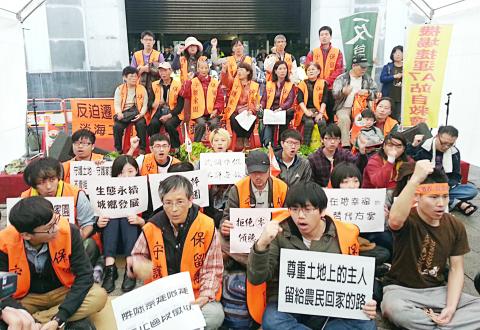Opponents of the phase-II development of Tamhai New Town (淡海新市鎮) yesterday asked the central government to evaluate the deal’s social and economic impact on the community and to hold a public hearing before setting the boundaries for the land seizure.
As the Environmental Protection Administration (EPA) was scheduled to hold its fourth meeting on setting the boundaries of the development yesterday, dozens of residents of New Taipei City’s Tamsui District (淡水), environmental activists and Tamkang University students camped outside EPA headquarters beginning on Wednesday night, to appeal to the public on the issue.
They protested before the meeting started yesterday morning and demanded that members of the review board go over the details of the development deal line-by-line.

Photo: CNA
Lu Cheng-chung (盧正忠), who is with a group opposing the town’s further development, said they thought the EPA was helping the Ministry of Interior’s Construction and Planning Agency rush through the boundary-setting meetings to get them done in one day.
Lu said the proposed phase-II development would force more than 1,600 households to relocate. He added that the new development is unnecessary because there are still many unsold houses and underdeveloped properties within the boundaries of the phase-I development.
“The Construction and Planning Agency said that the land expropriated for the phase-II development would be used to build an eco-friendly city and a ‘paradise for elderly citizens,’ but we feel that our environment is already rich in terms of biodiversity,” Lu said. “It is really gratuitous to destroy the biodiversity and build an artificial eco-friendly city. The elderly people in the community are, on the other hand, happy and self-sufficient. They do not need to be relocated so that a ‘paradise’ can be built for them.”
Lu said the government has planned to seize about 1,200 hectares of land for the phase-II development, with most of the targeted area being farmland.
Ling Hong Ching-tze (林洪清子), who is in her 80s, said this was not the first time that the government has seized her property. She said that she was once asked to give up 661 hectares for a section of highway to be built, and was compensated with just NT$1.7 million (US$56,000 at current exchange rates).
She added that she has been approached again by developers because of the project.
She said she was told that she would have to swap a larger area of land for a smaller one and buy back the land that she owned.
“I am pretty content with the land I have now, which has natural water coming from Datunshan (大屯山),” she said. “How can I find the money to buy back the land? And I should not have to buy back land that is mine.”
Residents supporting the development responded with their own data, saying that 542 households would need to relocate.
Tamsui District Administrator Tsai Yeh-wei (蔡葉偉) said that about 157 hectares of land to be expropriated are fallow farmland, with no trees, endangered species or historical sites to be protected.
One woman held a poster bearing the signatures of other residents who support the proposed development. She said development is good for the community, since more than 70 percent of its young people have left town to seek jobs elsewhere.

Taiwanese can file complaints with the Tourism Administration to report travel agencies if their activities caused termination of a person’s citizenship, Mainland Affairs Council Minister Chiu Chui-cheng (邱垂正) said yesterday, after a podcaster highlighted a case in which a person’s citizenship was canceled for receiving a single-use Chinese passport to enter Russia. The council is aware of incidents in which people who signed up through Chinese travel agencies for tours of Russia were told they could obtain Russian visas and fast-track border clearance, Chiu told reporters on the sidelines of an event in Taipei. However, the travel agencies actually applied

Japanese footwear brand Onitsuka Tiger today issued a public apology and said it has suspended an employee amid allegations that the staff member discriminated against a Vietnamese customer at its Taipei 101 store. Posting on the social media platform Threads yesterday, a user said that an employee at the store said that “those shoes are very expensive” when her friend, who is a migrant worker from Vietnam, asked for assistance. The employee then ignored her until she asked again, to which she replied: "We don't have a size 37." The post had amassed nearly 26,000 likes and 916 comments as of this

New measures aimed at making Taiwan more attractive to foreign professionals came into effect this month, the National Development Council said yesterday. Among the changes, international students at Taiwanese universities would be able to work in Taiwan without a work permit in the two years after they graduate, explainer materials provided by the council said. In addition, foreign nationals who graduated from one of the world’s top 200 universities within the past five years can also apply for a two-year open work permit. Previously, those graduates would have needed to apply for a work permit using point-based criteria or have a Taiwanese company

The Shilin District Prosecutors’ Office yesterday indicted two Taiwanese and issued a wanted notice for Pete Liu (劉作虎), founder of Shenzhen-based smartphone manufacturer OnePlus Technology Co (萬普拉斯科技), for allegedly contravening the Act Governing Relations Between the People of the Taiwan Area and the Mainland Area (臺灣地區與大陸地區人民關係條例) by poaching 70 engineers in Taiwan. Liu allegedly traveled to Taiwan at the end of 2014 and met with a Taiwanese man surnamed Lin (林) to discuss establishing a mobile software research and development (R&D) team in Taiwan, prosecutors said. Without approval from the government, Lin, following Liu’s instructions, recruited more than 70 software